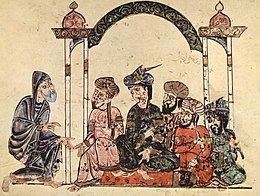Etymology of Arab
This article has multiple issues. Please help improve it or discuss these issues on the talk page. (Learn how and when to remove these template messages)
|
| Part of a series on |
| Arabic culture |
|---|
 |
The proper name Arab or Arabian (and cognates in other languages) has been used to translate several different but similar-sounding words in ancient and classical texts which do not necessarily have the same meaning or origin. The etymology of the term is closely linked to that of the place name
Semitic etymology
The root of the word has many meanings in Semitic languages including desert, nomad, merchant, and comprehensible with all of these having varying degrees of relevance to the emergence of the name. It is also possible that some forms were metathetical from root ع-ب-ر ʿ-B-R "moving around", and hence, it is alleged, "nomadic". [citation needed]
The plurality of meanings results partly from the assimilation of the
In Arabic
The oldest surviving indication of an Arab identity is an inscription made in early Arabic using the Nabatean Aramaic alphabet in 328 CE, which refers to
In the
The plural noun ʾaʿrāb refers to the
- الأعراب أشدّ كفرًا و نفاقًا
- al-ʾaʿrāb-u ʾašadd-u kufr-an wa-nifāq-an
"the Bedouin are the worst inhypocrisy".
Based on this, in early Islamic terminology, عرب ʿarab referred to sedentary Arabs, living in cities such as Mecca and Medina, and أعراب ʾaʿrāb referred to the Arab Bedouins, carrying a negative connotation as shown in the prior Qur'anic verse. Following the
- Cf. the modern toponyms Algarve (from Gharb al-Andalus) and Arava
In Assyrian
The term mâtu arbâi describing Gindibu is found in Assyrian texts and is translated as of Arab land. Variations of the ethnonym are also found including: ʿArabi, ʿArubu, ʿAribi and ʿUrbi. The presence of Proto-Arabic names amongst those qualified by the terms arguably justifies the translation "Arab" although it is not certain if they all in fact represent the same group. They may plausibly be borrowings from Aramaic or Canaanite of words derived from either the proto-Semitic root ġ-r-b or ʿ-r-b.
It is in the case of the Assyrian forms that a possible derivation from ġ-r-b ("west") is most plausible, referring to people or land lying west of Assyria in a similar vein to the later Greek use of the term Saracen meaning in Arabic "Easterners", šarqiyyūn for people living in the east.
In Hebrew
In Hebrew the words ʿarav and ʿaravah literally mean "desert" or "steppe". In the Hebrew Bible the latter feminine form is used exclusively for the
In the Bible, the word ʿarav is closely associated with the word ʿerev meaning a "mix of people" which has identical spelling in unvowelled text.
The Bible Kings I 10:15 also refers to the 'Kings of Ereb' - וְכׇל־מַלְכֵ֥י הָעֶ֖רֶב. This is in context of a listing of King Solomon's great wealth, of which some came from his apparent vassals and lesser potents. Commentators there link the word ereb to the Hebrew word for dependence, guarantee, guarantor, patron, and collateral (see for example Genesis 45:32). [5] Commentators explicitly assume these Kings of Ereb are linked with the ethnic grouping, Arab. [6] The etymology thus means Arabs were vassal kings or lords, in this case, subservient to the ruling Jewish kings of the time and region.
The early Nabateans are also referred to as ʿarvim in
The words ʿaravim (plural of ʿaravi ) and ʿarvim appear the same in unvowelled texts as the word ʿorvim meaning
2
Notes
- ^ Sabaic Dictionary (English-French-Arabic) p. 18, A.F.L. Beeston, W.W. Muller, M.A. Ghul, J. Ryckmans
- ghayinwas not phonemic, it could be connected with the "mixture" meaning, as evening is when day mixes with night.
- ISBN 9789004136076.
- ISBN 9780521514309.
- ^ "I Kings 10:15".
- ^ "I Kings 10:15".
Bibliography
- Edward Lipinski, Semitic Languages: Outlines of a Comparative Grammar, 2nd ed., Orientalia Lovanensia Analecta: Leuven 2001. ISBN 90-429-0815-7
- The Catholic Encyclopedia, Robert Appleton Company, 1907, Online Edition, K. Night 2003: article Arabia
- The Jewish Encyclopedia, Funk and Wagnalls, 1901-1906, Online Edition, JewishEncyclopedia.com, 2002: article Arabia
- The New Revised Standard Version, Division of Christian Education of the National Council of the Churches of Christ in the United States of America, 1989, 1995.
- Fenton, Ferrar. The Holy Bible in modern English : containing the complete Sacred Scriptures of the Old and New Testaments, Destiny Publishers, Merrimac, Massachusetts, U.S.A., 1906, 1966. OCLC 234057370
- Grunebaum, G. E. von (1970). Classical Islam: A History 600 A.D. - 1258 A.D.. Aldine Publishing Company. ISBN 0-202-15016-X
- Durant, Will (1950). The Age of Faith: A History of Medieval Civilization -- Christian, Islamic, and Judaic -- from Constantine to Dante: A.D. 325-1300. The Story of Civilization, volume IV. New York: Simon and Schuster. OCLC 45079949.
